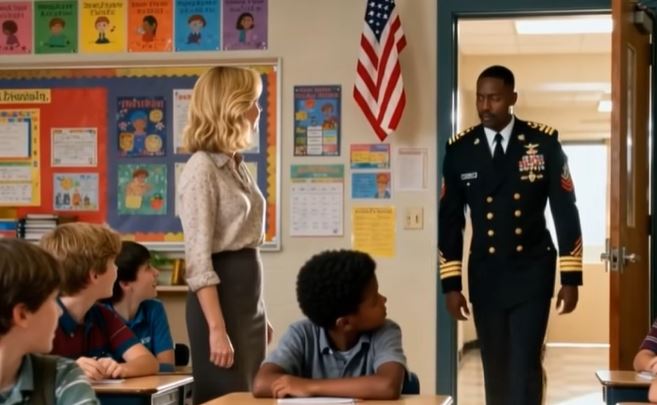It was a morning like any other in Mrs. Davison’s fifth-grade class. The sun streamed through the windows as the teacher went around the room, asking a simple question: “What do your parents do for a living?” The children responded with pride, sharing stories of lawyers, business owners, and engineers. The atmosphere was light and cheerful until the question reached a quiet boy named Marcus. He was often overlooked, known more for his quiet fascination with how things worked than for his social skills. His clothes were a bit more worn than the others’, a detail that had not gone unnoticed by his peers.
When it was his turn, Marcus hesitated, his voice barely a whisper. “My parents don’t work,” he said. The reaction was swift and cruel. A wave of laughter erupted from the other students. But what made the moment truly devastating was the teacher’s response. With a dismissive smirk, she added, “That explains your old clothes.” The laughter grew louder, and Marcus’s eyes welled with tears, his head bowing under the weight of the humiliation. In that moment, the classroom felt less like a place of learning and more like a arena of judgment.
The scene was shattered by a firm knock. The classroom door opened to reveal a man standing tall in a crisp military uniform. The room fell into an immediate, stunned silence. His presence commanded respect without him saying a word. He walked directly to Marcus’s desk, his eyes softening as he looked at the boy. “Marcus,” he said, his voice calm and steady, “you left your notebook in the car.” He placed the notebook on the desk, and as he did, every student in the room could clearly read the name embroidered on his uniform: Commander Jenkins.
The commander then turned his gaze to the teacher, who had gone pale. He didn’t raise his voice. He didn’t need to. “It’s important for children to be proud of those who raise them,” he stated quietly. The weight of his words filled the room, pressing down on every student and the teacher who had moments before led the mockery. There were no more laughs, no more smirks. There was only a profound and uncomfortable silence, broken by the sound of a powerful lesson being learned. The commander gave his son’s shoulder a reassuring squeeze and left as quietly as he had arrived.
The classroom remained silent long after the door closed. The teacher could not meet her students’ eyes. The children who had laughed so freely now stared at their desks, grappling with a new understanding of shame and respect. Marcus sat up a little straighter. He opened the notebook his father had brought him, a simple object that had become a symbol of a much larger truth. That day, the curriculum was unexpectedly rewritten to include a lesson on humility, the invisible sacrifices of service, and the profound mistake of judging a person’s worth by the clothes they wear.
